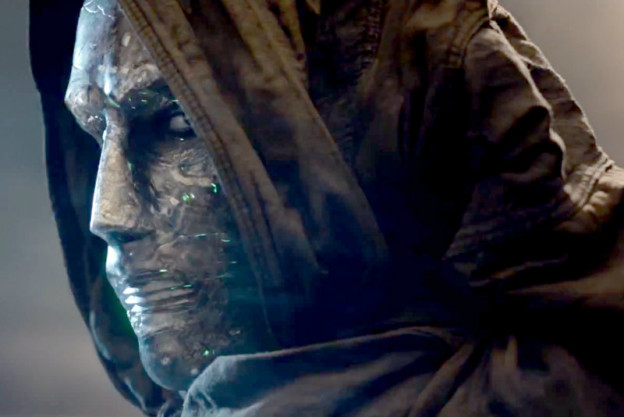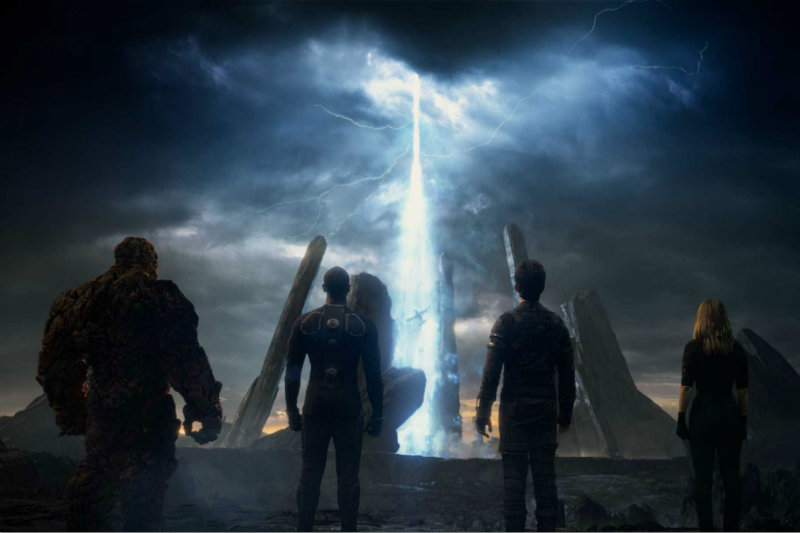Back in 1961, a team of superheroes named the Fantastic Four helped launch Marvel Comics into the pop cultural stratosphere (yes, even before Peter Parker was bitten by a radioactive spider). Dubbed “Marvel’s First Family”, the team kicked off the interconnected universe that ties together the company’s endless supply of heroes and villains, a world that has now been realized on the big screen. However, due to rights issues, the Fantastic Four remains a standalone product, but given that the first attempt to launch a franchise ended unceremoniously, the question lingered on for years if Fox could reinvigorate the fading property. Now we know.
Using the Ultimate version of the Four from the comics, the new film from director Josh Trank (Chronicle) centers on Reed Richards (Miles Teller), a young scientific genius who has stumbled upon the key to interdimensional travel. He is ultimately discovered by Franklin Storm (Reg E. Cathey) and, along with fellow scientists Sue Storm (Kate Mara) and Victor von Doom (Toby Kebbell), leads to a breakthrough the likes of which the world has never seen. Of course, it’s no surprise that things also don’t go too well, and the group ends up with supernatural abilities.
Despite Trank’s adjustments to the initial origin story, the problems with Fantastic Four lie far deeper than merely changing details of these characters’ comic book counterparts. Rather, the film might just be one of the most frustrating releases of the year so far due to its failure on a narrative level. Early on, the film sets the stages for its character’s journeys, but the film never sees them through.
Perfect example: soon after the incident that in essence creates the heroes, the film jumps ahead a year. While such shortcuts can greatly improve a film’s pacing and overall cohesiveness, Fantastic Four actually follows a drawn-out first act by skipping over the most interesting part of the story. We never really get to see the characters struggle or grow to accept their powers, as the film appears more interested in adhering to the outdated format of what superhero origin stories are meant to be, never going deeper into who these characters are or frankly why moviegoers should care.
The film’s dark tone, in addition to being an approach that doesn’t naturally suit these particular characters, never feels earned. Any attempts at humor (of which there are very few) fall incredibly flat, and so audiences are left with a dour, half-formed mess of a film that fails to reach its potential. Even worse, Fantastic Four awkwardly tosses logic aside on numerous occasions, shoehorning characters into scenes just because they have to be there and deciding that, no, character motivations don’t need to be established in the slightest.
This is all a true shame because Trank has assembled a cast of very charismatic actors. Teller and Kebbell have already played variations on the gifted prodigy and the nefarious villain in Whiplash and Dawn of the Planet of the Apes, respectively (both films that are far superior to this one). So their roles in particular are believable early in the film before it devolves into the Cliffs Notes version of its own story. Moreover, Jamie Bell and Michael B. Jordan prove to be decent selections for Ben Grimm/The Thing and Johnny Storm/The Human Torch, but the material never lends much life to their characters to begin with.
Still, Fantastic Four has its good points. The visual effects are fun to watch, even if the story they tell is mediocre at best. The Thing specifically looks great, though there’s not enough of him in the final film (a ton of footage from the trailers are absent). Again, the cast does the best they can with subpar material, and Kebbell’s Doctor Doom specifically has a standout sequence that essentially makes Doom more menacing than he has ever been before on the big screen.
On the whole, Fantastic Four features some interesting ideas that never really explored, and as a result, the mishmash of footage we see during the 100-minute runtime doesn’t really feel like a film but a hint of what could come next. There is little progression or logic in the story, no emotional connection to the events onscreen (a key character’s death barely registers) and even the Four themselves feel barely connected to each other by the end, let alone the powerful superhero team they’re meant to be. Ultimately, it’s anyone’s guess whether the fault here lies with Trank’s vision or studio meddling (likely a combination of both), but somehow, the resulting film holds together even more poorly than its predecessors.


